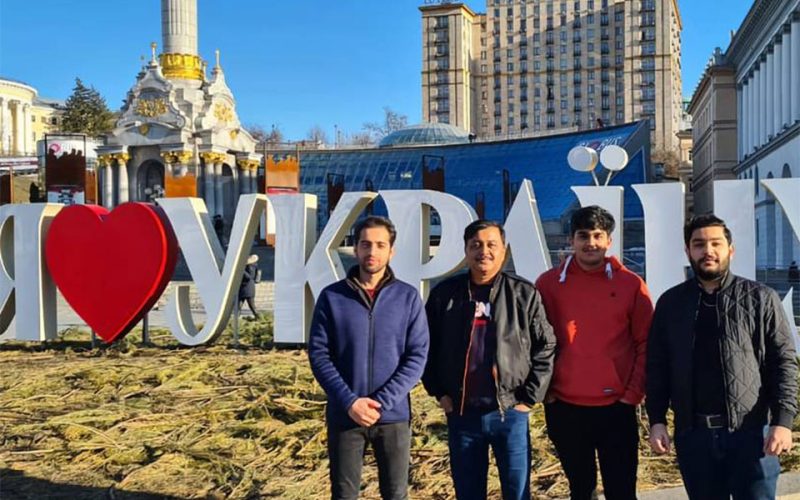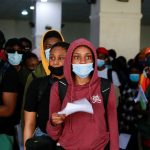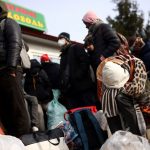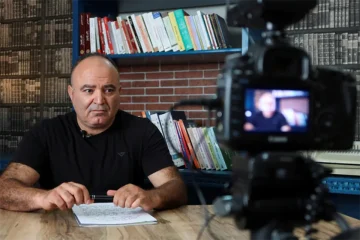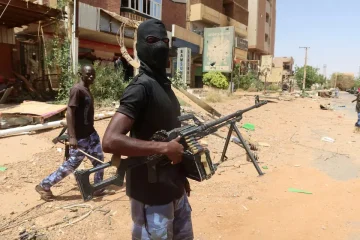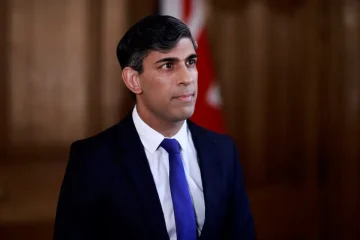KIM HARRISBERG and NITA BHALLA
WITH the sound of shelling over overhead, Nigerian medical student John Adebisi has been trapped for nine days in a basement in the north-east Ukrainian town of Sumy, wracked by fear and without enough money or means to escape.
More than 1 million refugees have fled Ukraine since Russian troops invaded on February 24, but many more are stuck, particularly foreign students whose governments and families lack planes, cash or connections to get them out.
Racism makes it harder to flee, several students said, after watching social media videos of African, Asian and Middle Eastern travellers being assaulted by border guards and turned away from buses and trains while white people were let through.
“In terms of evacuation, we need a lot of money to pay for things because people are trying to extort us,” Adebisi told the Thomson Reuters Foundation, adding that money transfer apps were not working and their cards had reached their withdrawal limits.
“Some students were charged up to $600 to get to the west of Ukraine … we have heard there is racism at the borders, which is something we experienced even before the fighting broke out. Black students are treated differently,” the 27-year-old said.
Thousands are estimated to have died in the biggest attack on a European state since 1945, which has led to a barrage of economic measures against Russia, and stoked fears of wider conflict in the West.
Ukraine’s foreign ministry said on Twitter that there is no discrimination in crossing the border and a “first come first served approach applies to all nationalities”.

But Tanmay, who is Indian, said Ukrainian guards abused his brother as he tried to leave Ukraine.
“A guard near the Polish border shoved my brother and tossed away his suitcase, yelling and screaming at him and his (friends) to go away,” Tanmay said in interview from Delhi.
“My brother said … the Ukrainian guards allow (white) people to go through … The message was, ‘If you’re not white, your life doesn’t matter’,” said Tanmay, 24, who asked not to share his brother’s name for his safety.
‘NO AUTHORITIES’
Ukraine has been popular with foreign students who want a relatively cheap education overseas. Government data shows 76,000 students from 155 nations were enrolled in Ukrainian universities.
After an Indian student was killed by shelling on Tuesday, Prime Minister Narendra Modi discussed the evacuation of his citizens with Russian President Vladimir Putin.
Other nationals are less fortunate.
Syrian Orwa Staif was studying in Kharkiv, Ukraine’s second biggest city, where bombing has left its centre a wasteland of ruined buildings and debris.
Staif said he had to bribe the cashier to get him and three friends onto a train to the western city of Lviv, close to the Polish border.
The 24-year-old software engineering student said he hopes to travel “anywhere that is safe.”
“It’s complicated because we do not have an embassy in Ukraine and we have no authorities to ask for support,” said Staif, whose country has been in crisis since insurgents tried to overthrow President Bashar al-Assad in 2011.
‘TRAUMATIC EXPERIENCE’
With little government support, shuttered banks and empty cash machines, foreign nationals in Ukraine have come together to lend money and help each other out.
Afifa Maham, a medical student from Pakistan, said that 50 of them hired a private bus, each paying $50, to reach Shehyni, on the western border of Ukraine and Poland.

A journey that typically takes 2.5 hours took them 13 because of traffic jams and long queues at passport control.
“Short of 30 km, we saw a huge traffic jam. Our driver asked us to step out of the bus and walk to the border, carrying our heavy suitcases … It was a traumatic experience,” said Maham.
“When we reached the border, there was a massive crowd and there was lot of brawling and screaming. We were too scared to move further up to the gate,” said Maham, who eventually entered Warsaw four days later with help of the Pakistani ambassador.
Ghassan Abdallah, 28, a Lebanese student at the Kharkiv National Medical University, said he spent $900 between trains, private cars and hotels to reach Romania. He then borrowed $1,300 from friends in Romania to fly home to Beirut.
Egyptian brothers and dentistry students Mohamed and Mahmoud Hossam also borrowed money from on friends in Kiev – $680 to get bus tickets to the Polish border and then fly home to Cairo.
“If it were not for our friends here, we would not be able to make it,” 22-year-old Mohamed said.
DEPENDENT FAMILIES
Getting out of Ukraine is only the first step.
Several Nigerian students who have made it to Poland and Hungary said they could not afford to go home – and the sacrifices their families made to send them to Ukraine meant they had to find a way to finish their degrees in Europe.
“My parents are farmers who grow cassava,” Ehigiamusoe Godfrey, who was studying languages in Ukraine’s eastern city of Dnipro with the hope of being able to support his parents after graduation.
“They sold everything to send me to study in Ukraine,” Godfrey, 24, said by Whatsapp call from a church-funded hotel room in Lodz in central Poland, where he has food and accommodation for the next three days.
The Nigerian government plans to evacuate over 5,000 of its nationals from Poland, Hungary and Romania and on Thursday dispatched two planes to Warsaw and Bucharest.
“Some of us are waiting for the Nigerian government to arrange a flight, but we don’t know when that will happen,” said medical student Ogunnika Oluwanifemi who travelled by bus and train for four days from southeastern Ukraine to Hungary.

“Our parents back home took out loans to send us to Ukraine. How can we ask them (for money) when we know they are already in debt?” said Oluwanifemi, 20, whose parents run a small business in Nigeria’s Ondo state.
Many are now dependent on the kindness of strangers.
Natalia Mufutau, who is Polish and married to a Nigerian, is mobilising people in Poland to help stranded Africans.
“We are doing everything, from organising buses to transport them and providing immigration information and translation at the border,” Mufutau said by phone from the Finnish capital, Helsinki, where she lives.
“Some of their families can send them a little money, like about 25 euros ($28). But it’s not enough for them to survive here so we are trying to raise funds so we can support them.”
Meanwhile, Adebisi remains in his Sumy apartment with eight other Nigerian friends, hoping to eke out their funds until a safe evacuation strategy is in place.
“It is scary, we don’t know what will happen in the next hour. We saw on social media that Africans have died trying to cross the border, from hypothermia and exhaustion,” he said.
“We see photos of places we have visited in Ukraine now destroyed by bombs. This feeling is not something I would wish on anybody.”

